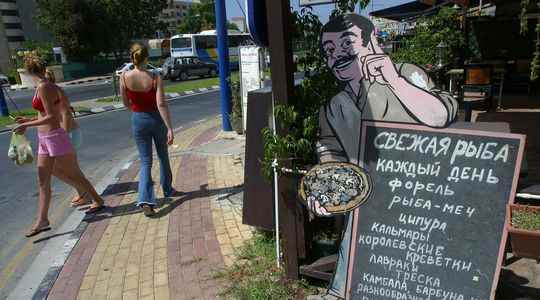Soon persona non grata, ordinary Russians? This Wednesday, August 31, the European Union decided to withdraw an agreement, signed before the war, which allowed Russians to obtain a visa in an accelerated manner. “This will significantly reduce the number of new visas issued by EU member states,” said Josep Borrell, the head of European diplomacy. The idea of closing the door to the Russians has until now torn member states apart, between the need to punish the war in Ukraine and the need not to reform hermetic blocs, as in the days of the Cold War.
What does this mean concretely?
The European Union unravels, without banning. This decision marks the return to the classic procedure for obtaining a visa for the Schengen area (22 EU states, plus Norway, Iceland, Switzerland and Liechtenstein). This is longer and more expensive. After the outbreak of the conflict, the facilitation agreement had already been partially suspended by the EU for certain Russian citizens linked to the regime (official delegations, holders of diplomatic passports, business leaders, etc.), but the others continued to benefit from it.
What put spokes in the wheels of Russian tourists, while the European Union claims to have noted “a substantial increase in border crossings from Russia to neighboring states, (…)”, presenting “a security risk “. In 2021, the 26 countries of the Schengen area received three million short-stay visa applications in all categories (tourism, studies, business trips, etc.). Of these visitors, Russians were the most numerous, with 536,000 requests. There might be a queue.
What will member countries do?
Prior to this announcement, Poland, Estonia, Latvia and Lithuania have indicated that they want to restrict the visas they grant to Russian nationals, regardless of European policy on the issue. Nothing prevents them from doing so: “It is legally possible for countries to block Schengen visas issued by other countries. If Lithuania (or other states) wants to prevent Russians from entering its country, it can to do at the national level, on the decision of its Minister of the Interior”, recognized a diplomatic source to AFP, this Wednesday;
The Czech Republic, the Baltic States and Poland have already tightened their visa regime to varying degrees (total stop or for tourists only), with exceptions. A country through which many Russian tourists travel to the Schengen area, Finland, which processes some 1,000 visa applications per day, has decided to reduce the number of visas issued to Russian tourists to 10% from September 1, in the face of Russian tourism deemed unbearable. If the suspension of the agreement is seen as a “first step” by these governments, they ask to drastically limit “the number of visas issued, especially tourist visas, to reduce the flow of Russian citizens to the EU and the Schengen area”.
Why is the visa issue so controversial?
According to Josep Borrell, the ministers meeting in Prague agreed that relations with Moscow “could not remain unchanged” and that the agreement should be “completely suspended”. Still, Europe differs on the strength of the restrictions to adopt. Unlike the Baltic States, Hungary, Austria, Luxembourg, or even Germany and France are against the idea of cutting themselves off from Russian tourism, as requested by Ukrainian President Volodymyr Zelensky, in an exclusive interview with L’Express. “There will be no general visa ban for Russian citizens,” the Hungarian Foreign Minister announced on Wednesday, cutting short any further measures.
These leaders fear perverse effects in the event of a border closure. “We must not have a new iron curtain in Europe”, for example underlined the Luxembourg Minister for Foreign Affairs, Jean Asselborn, on Tuesday. France also considers that it is necessary to distinguish “warmongers (…) and Russian citizens, artists, students, journalists for example”. Beyond collective punishment, some specialists fear that European soft power will be dried up while the Russians are struggling to have access to the regime’s discordant voices: “The strength of the European Union is neither its armies nor its services information, nor its technologies: it is its ability to attract”, explained to L’Express on August 26 Cyrille Bret, researcher at the Jacques-Delors Institute.
What will Russia do?
While the Europeans were still consulting each other, Russia was already expressing its disagreement: “It is a very serious decision which could be taken against our citizens and such a decision cannot remain unanswered”, declared the spokesman of the Kremlin, Dmitri Peskov on Tuesday, without specifying the nature of the reprisals. “Little by little, Brussels, like the European capitals, is showing a total lack of judgment (…) This irrationality, which borders on madness, allows such measures (on visas) to be debated”, he said. spear.
